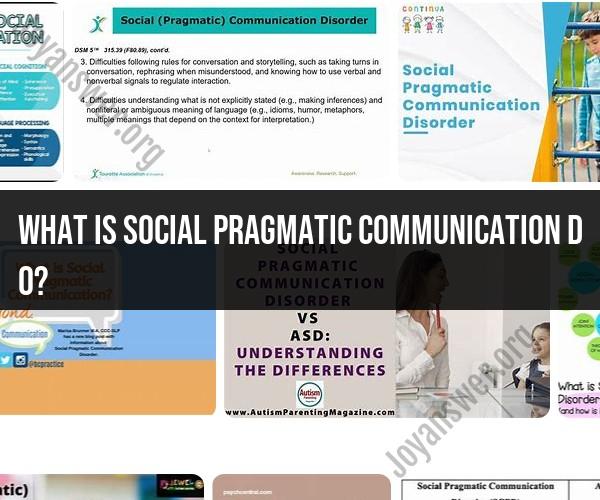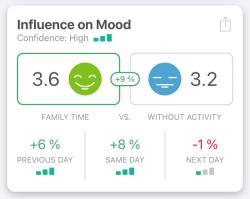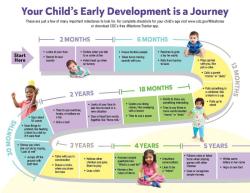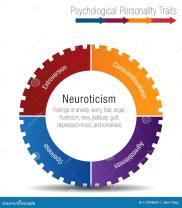What is social pragmatic communication D O?
Social Pragmatic Communication Disorder (SPCD) is a communication disorder that primarily affects an individual's ability to use verbal and nonverbal language for social purposes. It is characterized by difficulties in understanding and effectively using communication in social contexts, rather than being primarily associated with structural or phonological issues. Here are some key aspects of Social Pragmatic Communication Disorder:
Social Communication Challenges: Individuals with SPCD struggle with the social aspects of communication. They may have difficulty using language for various social purposes, such as engaging in conversations, initiating and responding to social interactions, and interpreting nonverbal cues like facial expressions, gestures, and tone of voice.
Pragmatic Language Difficulties: Pragmatics refers to the rules and conventions of using language in social contexts. People with SPCD may have difficulty understanding and applying these rules. This can lead to problems with turn-taking in conversations, staying on topic, understanding humor, sarcasm, and implied meaning, and adapting communication to different social situations.
Social Interaction Challenges: Individuals with SPCD may find it challenging to establish and maintain relationships due to difficulties in forming social connections through communication. They might struggle with making and keeping friends, interpreting social cues, and understanding the subtleties of social dynamics.
Language Comprehension: While SPCD primarily affects social communication, individuals may also experience some difficulty in language comprehension, including understanding complex sentences, idiomatic expressions, and figurative language.
Diagnosis and Differentiation: SPCD is often diagnosed in childhood, but it can persist into adulthood. It is important to differentiate SPCD from other communication disorders, such as specific language impairment (SLI) and autism spectrum disorder (ASD), as these conditions may share some characteristics with SPCD.
Treatment and Intervention: Treatment for SPCD typically involves speech-language therapy and interventions that focus on improving social communication skills, pragmatic language use, and understanding social cues. The goal is to help individuals with SPCD communicate effectively in various social settings and build meaningful relationships.
Importance of Early Intervention: Early identification and intervention are crucial in addressing SPCD. The earlier therapy and support are provided, the better the chances of improving social communication skills and reducing the impact of the disorder on daily life.
It's important to note that Social Pragmatic Communication Disorder is a distinct diagnosis recognized in the Diagnostic and Statistical Manual of Mental Disorders (DSM-5), a widely used classification system for mental health and developmental disorders. Individuals with SPCD may face challenges in academic, professional, and social settings, but with appropriate therapy and support, they can improve their social communication skills and lead fulfilling lives.
Social Pragmatic Communication Disorder (SPCD): Understanding the Condition
Social pragmatic communication disorder (SPCD) is a neurodevelopmental disorder that affects how people use and understand verbal and nonverbal communication in social situations. Individuals with SPCD may have difficulty using language in a way that is appropriate for the social context, understanding the intent behind others' communication, or using nonverbal cues, such as facial expressions and body language, effectively.
SPCD can have a significant impact on a person's ability to form and maintain relationships, participate successfully in school and work settings, and engage in social activities. It is important to note that SPCD is not the same as autism spectrum disorder (ASD), although the two conditions can co-occur.
Symptoms, Diagnosis, and Assessment of SPCD
The symptoms of SPCD can vary widely from person to person. Some common symptoms include:
- Difficulty starting and maintaining conversations
- Trouble taking turns in conversation
- Difficulty understanding jokes or sarcasm
- Difficulty interpreting nonverbal cues, such as facial expressions and body language
- Using language that is too formal or informal for the social context
- Difficulty understanding the different uses of language, such as conversational language, figurative language, and technical language
SPCD is diagnosed by a qualified professional, such as a speech-language pathologist or psychologist. The diagnostic process typically involves a comprehensive assessment of the individual's communication skills and social interactions.
Therapeutic Approaches and Interventions for SPCD
There is no one-size-fits-all approach to treating SPCD. The best treatment approach will vary depending on the individual's specific needs. However, some common therapeutic approaches and interventions include:
- Speech-language therapy: Speech-language therapy can help individuals with SPCD learn and practice social communication skills. This may include learning how to start and maintain conversations, take turns in conversation, and use language appropriately in different social contexts.
- Social skills training: Social skills training can help individuals with SPCD learn and practice specific social skills, such as making eye contact, using appropriate facial expressions, and reading body language.
- Cognitive-behavioral therapy (CBT): CBT can help individuals with SPCD identify and challenge negative thoughts and beliefs that may be contributing to their communication challenges.
Strategies for Supporting Individuals with Social Pragmatic Communication Challenges
There are a number of things that caregivers, teachers, and other professionals can do to support individuals with social pragmatic communication challenges. Some helpful strategies include:
- Providing clear and concise instructions
- Using visual supports and concrete examples
- Breaking down tasks into smaller steps
- Offering positive reinforcement
- Providing opportunities for social practice
- Collaborating with other professionals, such as speech-language pathologists and psychologists, to develop a comprehensive treatment plan
Building Effective Communication Skills in the Context of SPCD
Building effective communication skills takes time and practice for individuals with SPCD. However, there are a number of things that can be done to help support this process. Some helpful tips include:
- Model effective communication skills: Individuals with SPCD learn by watching the people around them. Modeling effective communication skills, such as using appropriate language and nonverbal cues, can help them learn how to communicate effectively themselves.
- Provide opportunities for social practice: The more opportunities individuals with SPCD have to practice their communication skills in a variety of social contexts, the better they will become at communicating effectively.
- Be patient and supportive: Learning new communication skills can be challenging for individuals with SPCD. It is important to be patient and supportive as they work to improve their communication skills.
With time, practice, and support, individuals with social pragmatic communication disorder can learn to communicate effectively in a variety of social contexts. This can help them to improve their relationships, succeed in school and work settings, and engage in social activities.













